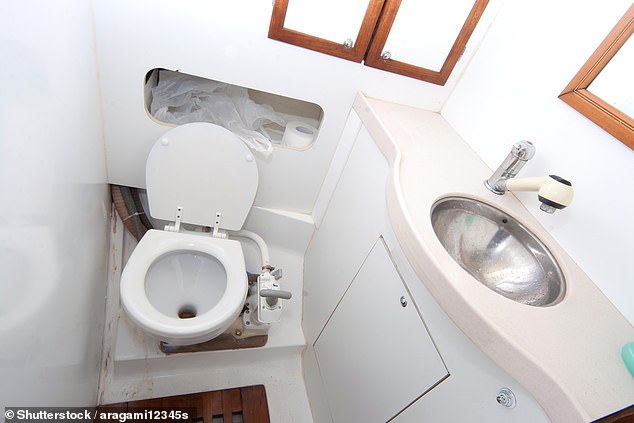Should we inspect the contents of the loo before flushing? That’s the suggestion from some scientists, who claim it can provide vital clues to the wellbeing of everything from our gut to our immune system.
We should be checking our poo regularly, they say — and even taking samples to send off for detailed testing as an early warning of health problems, including high blood pressure, diabetes and even depression.
Most of us are familiar with the idea that traces of blood in stools can be a possible sign of bowel cancer.

So-called ‘stool gazing’ has become all the rage, thanks to the emergence of smartphone apps that analyse the shape, colour and size of the contents of the loo from a smartphone camera photo
That’s why the NHS invites everyone aged 60 or over in England (the age limit is due to fall to 56 later this year) to undergo a bowel cancer screening check every two years, involving collecting a small sample using a home testing kit and sending it off to a lab.
Since blood can be caused by tiny growths in the bowel, called polyps, a positive result is not necessarily the sign of a tumour — but polyps can become malignant, so further investigations may be necessary.
Studies suggest this type of screening has helped reduce the bowel cancer death toll by up to 25 per cent, by detecting cancerous growths at a much earlier stage, when they are still curable.
But can testing our stools reveal other health problems, too?
So-called ‘stool gazing’ has become all the rage, thanks to the emergence of smartphone apps that analyse the shape, colour and size of the contents of the loo from a smartphone camera photo.
Most rely on the Bristol Stool Chart. Widely used in the NHS, this is a pictorial illustration of seven types, from the healthy ‘sausage-like’ form to a potentially worrying watery discharge.
The apps don’t diagnose illnesses but allow users to monitor changes to discuss any concerns with their GP.

We should be checking our poo regularly, they say — and even taking samples to send off for detailed testing as an early warning of health problems, including high blood pressure, diabetes and even depression
One example is Poop Log, free on Android phones, which claims to track changes in size, shape, colour and blood or mucus content in each deposit.
It also allows users to document episodes of pain or discomfort while passing a stool, as well as any accompanying symptoms, such as nausea.
It can also plot changes in simple charts and graphs to identify patterns potentially linked to changes in diet or stress.
Yet stool gazing is ‘not necessary and is more likely to feed people’s anxieties over their health’, warns Professor Laurence Lovat, a consultant gastroenterologist at University College Hospital, London, who advises anyone with changes in bowel habits lasting more than a few weeks to see their GP.
Dr Duane Mellor, a dietitian and lecturer in gastroenterology at Aston University Medical School, in Birmingham, agrees: ‘Human beings are not machines — there’s a lot of variation between us when it comes to our stools. Too much data and too much observation of what might be a normal variation could simply increase anxiety.’
But other initiatives that involve analysing poo might be more useful. A new service, ZOE, due to launch later this year in the UK, offers people a report on the health of their microbiomes — the trillions of organisms that live in our guts — by analysing stool samples sent by post.
The microbiome includes ‘good’ bacteria which, scientists believe, may play a critical role in helping to control digestion and weight and also keeping our immune systems in prime condition.
The greater the variety of these bacteria, the more resilient the microbiome is to potential harm — from, for example, the damaging effects of antibiotics, which can kill off good bacteria in the gut.
A major study, published in the journal Gut in January, suggested that a healthy microbiome can even help fight off Covid-19.
Researchers at the Chinese University of Hong Kong took stool samples from 100 patients admitted to hospital with Covid-19, comparing them with those from 78 Covid-free volunteers.
Results showed a huge difference in their gut microbiomes — for example, Covid sufferers had much lower levels of bacteria species that prime the immune system. Researchers also speculated whether an unhealthy microbiome might help to explain why some people are affected by long Covid.
The ZOE technology looks for 15 ‘good’ bacteria associated with good health and 15 ‘bad’ ones linked to serious conditions including inflammatory bowel disease and obesity.
But how accurate will the test be? ‘This is an exciting idea but we cannot be sure the bacteria being measured in stools is the same as what is in the gut,’ warns Dr Mellor, adding that differing moisture, acidity and oxygen levels along the several metres of intestinal tissue could affect the reading.
He believes the real benefit of tests such as ZOE could be that they encourage healthier diets. He says: ‘This is about people buying into something that could directly benefit them — it might just nudge them in the right direction.’
Source link : https://www.dailymail.co.uk/health/article-9877387/Can-looking-loo-help-health-just-potty.html











